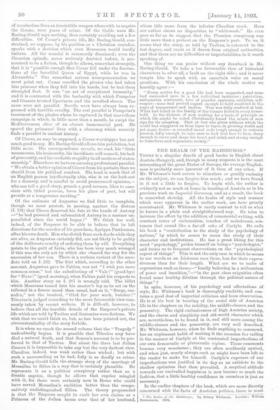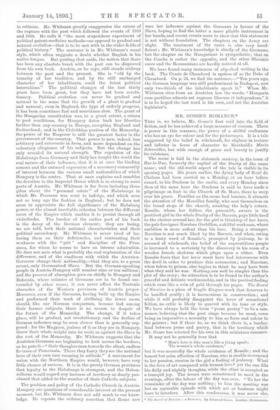THE REALM OF THE HABSBURGS.*
THERE is a singular dearth of good books in. English about Austria-Hungary, and, though in many respects it is the most interesting of the great States of Europe, the average English- man is probably more ignorant of it than of any other. If Mr. Whitman's book serves to stimulate or gratify curiosity on the subject, we can forgive him much ; and we have found in it not a little to forgive. To begin with, the author is evidently not so much at home in treating of Austria as in his previous work on Imperial Germany, and as a result, the book is somewhat sketchy. All the faults of style and manner which were apparent in the earlier work, are here greatly accentuated. Mr. Whitman is rarely content to tell us what he knows in a plain and straightforward way. He tries to increase the effect by the addition of ornamental writing, with constant notes of exclamation, touches of melodrama, sen- tences that sound like a far-off echo of Carlyle. He calls his book a "contribution to the study of the psychology of nations," by which he seems to mean the study of their character and institutions. He has a great liking for this word "psychology," prides himself on being a " psychologist," and treats us to frequent observations on the "psychological aspect of things." This is not the only case in which be seems to use words as an Irishman uses them, less for their expres- siveness than for their length. What are we to make of expressions such as these,—" fondly believing in a millennium of peace and inanition,"—"in the past class exiguities often found some healthy dilution through the political nature of things" P In spite, however, of his psychology and affectations of style, Mr. Whitman's book is thoroughly readable, and con- tains a good deal of impartial criticism and keen observation. He is at his best in treating of the social side of Austrian life in the chapters on the nobility, the middle-classes, and the peasantry. The rigid exclusiveness of high Austrian society, and the charm and simplicity and old-world character which are, nevertheless, to be found in it, and still more among the middle-classes and the peasantry, are very well described. Mr. Whitman, however, when he finds anything to commend, has an unpleasant habit of making it the occasion for railing in the manner of Carlyle at the contrasted imperfections of our own democratic or plutocratic regime. These comments become very wearisome ; they are often needlessly cynical, and when just, nearly always such as might have been left to the reader to make for himself. Carlyle's exposure of our imperfections was justified in its day as an antidote to the shallow optimism that then prevailed. A sceptical attitude towards our unrivalled happiness is now become so much the fashion, that a little healthy confidence in ourselves is just as necessary.
In the earlier chapters of the book, which are more directly concerned with the facts of Austrian politics, there is most
The Realm of the Habsburgs. By Sidney Whitman. Loudon s William Heinemann. 1898, to criticise. Mr. Whitman greatly exaggerates the extent of the rupture with the past which followed the events of 1859 and 1866. He calls it "the most stupendous experiment of political patent-medicine methods—as opposed to gradual and natural evolution—that is to be met with in the wider fields of political history." The sentence is in Mr. Whitman's usual style, which often suggests a doubt whether English is his native tongue. But putting that aside, the notion that there has been any absolute break with the past can be disproved from his own book. Austria, as he says, still stands midway between the past and the present. She is "old by the tenacity of her tradition, and by the still unchanged character of her inhabitants, amid the latest political innovations." The political changes of the last thirty years have been great, but they have not been revolu- tionary. Political evolution can never be gradual and natural in the sense that the growth of a plant is gradual and natural ; even in England, the type of orderly progress, it has been sometimes fast and sometimes slow. The grant of the Hungarian constitution was, to a great extent, a return to past conditions, for Hungary dates back her liberties farther than any country in Europe, excepting England and Switzerland; and in the Cisleithian portion of the Monarchy, the power of the Emperor is still the greatest factor in the government of the country. That power is now, indeed, lees arbitrary and autocratic in form, and more dependent on the voluntary allegiance of his subjects. But the change has only revealed its natural strength. The expulsion of the Habsburgs from Germany and Italy has taught the world the real nature of their influence, that it is at once the binding cement and the outward expression of a necessary community of interest between the various small nationalities of which Hungary is the centre. That at once explains and ennobles the devotion to the Imperial House which is so strong in most parts of Austria. Mr. Whitman is far from imitating those gibes about the "personal estate" of the Habsburgs in which Mr. Freeman was wont to indulge, and which were not so long ago the fashion in England ; but he does not seem to appreciate the full significance of the Habsburg power, or the almost inevitable cohesion between the different races of the Empire which enables it to persist through all vicissitudes. The burden of the earlier part of his book is the decay of the German element; they are losing, we are told, both their national characteristics and their political ascendency. Mr. Whitman is never tired of lec- turing them on their deficiencies, and contrasting their weakness with the " grit " and discipline of the Prus- sians, for whom he seems to have an intense admiration. He does not note what is probably the real explanation of the difference, and of the readiness with which the Austrian- Germans change their nationality,—that they arc, to a great extent, only Germanised Slays. But the German-speaking people in Austria-Hungary still number nine or ten millions ; and the process of absorption goes on chiefly in Hungary and Bohemia, where colonies of Germans are to be found sur- rounded by other races ; it can never affect the Teutonic character of the Western provinces of Austria proper. Moreover, even if the Germans, having built up the Empire and performed their work of civilising the lower races, should, like our Norman conquerors, become lost among their former subjects, there is no reason to despair of the future of the Monarchy. The change, if it takes place, will be gradual, not revolutionary, and the decline of German influence may be even slower than is generally sup- posed for the Magyars, jealous of it as they are in Hungary, throw their whole weight into its scale as against the Slays in the rest of the Monarchy. Mr. Whitman suggests that the Austrian-Germans are beginning to look across the borders; as he puts it—" their thoughts turn towards the silent, endless fir-trees of Pomerania. There they fancy they see the national hero of their own race roaming in solitude." A movement for union with the Northern Empire would, however, have very little chance gf success. It is in the purely German provinces that loyalty to the Habsburgs is strongest, and the Hohen- zollerns would regard any increase of territory as dearly pur- chased that added to the number of their Catholic subjects.
The position and policy of the Catholic Church in Austria- Hungary are questions of considerable interest at the present moment, but Mr. Whitman does not add much to our know- ledge. He repeats the ordinary assertion that Rome now uses her influence against the Germans in favour of the Slays, hoping to find the latter a more pliable instrument in her hands, and recent events seem to show that this statement is not without foundation. The chapters on the Army arc slight. The treatment of the races is also very insuf- ficient; Mr. Whitman's knowledge is chiefly of the Germans, but the chapter on the Hungarians is sympathetic; that on the Czechs is rather the opposite, and the other Slavonic races and the Roumanians are hardly noticed at all.
We have found many instances of slip-shod writing in the book. The Comte de Chambord is spoken of as the Duke of Chambord. On p. 24, we find the sentence,—" Ten years ago, the German language was still predominant in Budapest, now only two-thirds of the inhabitants speak it." When Mr. Whitman cites from an Austrian law the words, " Hungaria cum paatibus adnexis est regnum liberurn et independans," it is to be hoped the last word is his own, and not the Austrian legislator's.



































 Previous page
Previous page